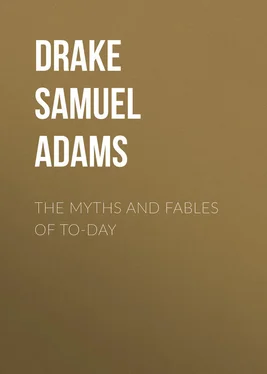Samuel Drake - The Myths and Fables of To-Day
Здесь есть возможность читать онлайн «Samuel Drake - The Myths and Fables of To-Day» — ознакомительный отрывок электронной книги совершенно бесплатно, а после прочтения отрывка купить полную версию. В некоторых случаях можно слушать аудио, скачать через торрент в формате fb2 и присутствует краткое содержание. Жанр: Старинная литература, foreign_antique, foreign_prose, на английском языке. Описание произведения, (предисловие) а так же отзывы посетителей доступны на портале библиотеки ЛибКат.
- Название:The Myths and Fables of To-Day
- Автор:
- Жанр:
- Год:неизвестен
- ISBN:нет данных
- Рейтинг книги:5 / 5. Голосов: 1
-
Избранное:Добавить в избранное
- Отзывы:
-
Ваша оценка:
- 100
- 1
- 2
- 3
- 4
- 5
The Myths and Fables of To-Day: краткое содержание, описание и аннотация
Предлагаем к чтению аннотацию, описание, краткое содержание или предисловие (зависит от того, что написал сам автор книги «The Myths and Fables of To-Day»). Если вы не нашли необходимую информацию о книге — напишите в комментариях, мы постараемся отыскать её.
The Myths and Fables of To-Day — читать онлайн ознакомительный отрывок
Ниже представлен текст книги, разбитый по страницам. Система сохранения места последней прочитанной страницы, позволяет с удобством читать онлайн бесплатно книгу «The Myths and Fables of To-Day», без необходимости каждый раз заново искать на чём Вы остановились. Поставьте закладку, и сможете в любой момент перейти на страницу, на которой закончили чтение.
Интервал:
Закладка:
Should you meet a person on the stairs, one or the other must go back, or some misfortune will happen to both.
If you should fail to fold up your napkin after a meal at which you are a guest, you will not again be invited to that table.
Think of the devil and he is at your elbow. The point of this robust saying is now much softened into “think of some one and he is at your elbow”; but it seems at first to have had reference to an enemy or to one you would rather avoid. The saying is quite common to-day.
A very old rhyme about the way in which one wears out a shoe, runs in this way: —
“Tip at the toe, live to see woe,
Wear at the side, live to be a bride,
Wear at the ball, live to spend all,
Wear at the heel, live to save a deal.”
Even the days of the week possess peculiar significance to the future welfare of the newborn infant: —
“Sunday’s child is full of grace,
Monday’s child is fair of face,
Tuesday’s child is solemn and sad,
Wednesday’s child is merry and glad;
Thursday’s child is inclined to thieving,
Friday’s child is free in giving:
Saturday’s child works hard for his living.”
This saying is familiar to every one: —
“Whistling girls and crowing hens
Always come to no good ends.”
Or, as they say it in the Old Country: —
“A whistling woman and crowing hen,
Are neither fit for God nor men.”
An old woman, skilled in such matters, declares that when vagrant cats begin to collect around the back-yards, “it’s a sure sign the winter’s broken.”
Whistling to keep one’s courage up, or for a wind, are rather in the nature of an invocation to some occult power than a sign. Sailors, it is well known, have a superstitious fear of whistling at sea, believing it will bring on a storm.
Yawning is said to be catching. Well, if it is not catching, it comes so near to being so, that most persons accept it as a fact; and laugh as we may, daily experience goes to confirm it as such, and must continue to do so until some more satisfactory explanation is found than we yet know of.
V
CHARMS TO GOOD LUCK
“The nights are wholesome; then no planets strike,
No fairy takes, nor witch hath power to charm.”
Of the things closely associated in the popular mind with good or bad luck, what in short one may or may not do to obtain the favors or turn aside the frowns of fortune, the list is a long one. We say “God bless me!” when we sneeze, as an invocation to good luck. Then, for instance, it is considered lucky to find a cast-off horseshoe, or a four-leaved clover, or to see the new moon over the right shoulder, or to have a black cat in the house, especially one that comes to you of its own accord. Then there also is the lucky pocket-piece, which the owner will seldom part with, although I once heard a man loudly lamenting that he had “sold his luck” by doing so. There also is the lucky-bone of a haddock, 8 8 It was commonly believed that the haddock bore the mark of St. Peter’s thumb, ever since that saint took the tribute penny out of a fish of that species.
the wishing-bone of a chicken, the lucky base-ball bat, and, what is still more strange, the lucky spider, if one happens to be found on one’s clothes, – though this will hardly prevent, we imagine, all womankind from screaming out to the nearest person to come and brush off the hateful little creature. Many will not kill a spider on account of this belief, which is supposed to be derived from the romantic story of King Robert Bruce and the spider.
The familiar saying, “There’s luck in odd numbers,” lingers in song and story. Does not Rory O’More say so? Odd numbers or combinations of odd numbers are almost invariably chosen in buying lottery tickets. Moreover, they have received the highest official sanction for a very long time. In the “Art of Navigation,” printed in the year 1705, the following rule is laid down for firing salutes by ships of the royal navy: “to salute with an odd number of guns, the which are to be answered with fit correspondency. And the number of odd guns is so punctually observed, that whenever they are given even ’tis received for an infallible sign that either the captain or some noted officer is dead in the voyage.”
The above rule or custom has held good to this day. In the United States the prescribed salute to the President is twenty-one guns; seventeen to the Vice-President, and so on in descending scale, according to rank, in the several branches of the civil, military, and naval service. Medicines are often taken an odd number of times, though not invariably, as they once were. A hen is always set on an odd number of eggs, although I could never find any one who could give any other reason than custom for it. What Biddy does when she “steals her own nest” is not ascertained.
It appears from such data as we have been able to gather that the number Three and its multiple Nine were formerly held to be indispensable to the successful working of the magician’s arts. In “Macbeth,” the weird sisters mutter the dark incantation: —
“Thrice to thine, and thrice to mine,
And thrice again to make up nine! —
Peace! – the charm’s wound up.”
And yet again, when concocting their charmed hell-broth, while awaiting the coming of the ambitious thane to learn his fate of them, the mystic rite begins by declaring the omens propitious: —
“1 Witch . Thrice the brinded cat hath mewed.
2 Witch . Thrice and once the hedge-pig whined.”
With the Romans, three handfuls of salt cast over a dead body had all the virtues of a funeral. Pirates were formerly hung at low-water mark and left hanging there until three tides had overflowed them. Shakespeare makes Falstaff say: “This is the third time; I hope good luck lies in odd numbers.” Even now, the cabalistic phrase “third time never fails,” prompts the twice unsuccessful candidate for fortune’s favors to renewed and more vigorous effort. In short, there seems to be no end to the virtues inherent in odd numbers.
But as all rules have their exceptions, so with this prophetic rule of three, the fates would seem to have ordained that it might be made to work both ways. Simply by keeping one’s eyes and ears open one sees and hears many things. An enterprising news-gatherer jots down a bit of superstition touching the fateful side of the rule in question that came to him in this easy sort of way: “I heard,” he says, “a most sensible person, the other day, exclaim because Queen Victoria had been obliged twice to postpone her trip to the south of France, once on account of the unsettled state of affairs over there, and again because of the unsettled state of the weather. ‘The third time will be fatal to her,’ added this cheerful individual; ‘you just mark my words.’”
It is nevertheless true, however, that the cabalistic number Thirteen stands quite alone, so far as we are informed, as the sombre herald of misfortune. But here, as elsewhere, the exception only goes to prove the rule.
A gentleman holding a lucrative office under the government once told me that two of his clerks wore iron finger rings, because they were supposed to be lucky. It is a matter of general knowledge that certain gems or precious stones are worn on scarf-pins, watch-chains, finger rings, or other articles of personal adornment solely on account of the prevailing belief in their efficacy to ward off sickness or disease, prevent accidents, keep one’s friends, – in short, to bring the wearer good luck. This branch of the subject will be more fully treated of presently.
Читать дальшеИнтервал:
Закладка:
Похожие книги на «The Myths and Fables of To-Day»
Представляем Вашему вниманию похожие книги на «The Myths and Fables of To-Day» списком для выбора. Мы отобрали схожую по названию и смыслу литературу в надежде предоставить читателям больше вариантов отыскать новые, интересные, ещё непрочитанные произведения.
Обсуждение, отзывы о книге «The Myths and Fables of To-Day» и просто собственные мнения читателей. Оставьте ваши комментарии, напишите, что Вы думаете о произведении, его смысле или главных героях. Укажите что конкретно понравилось, а что нет, и почему Вы так считаете.












